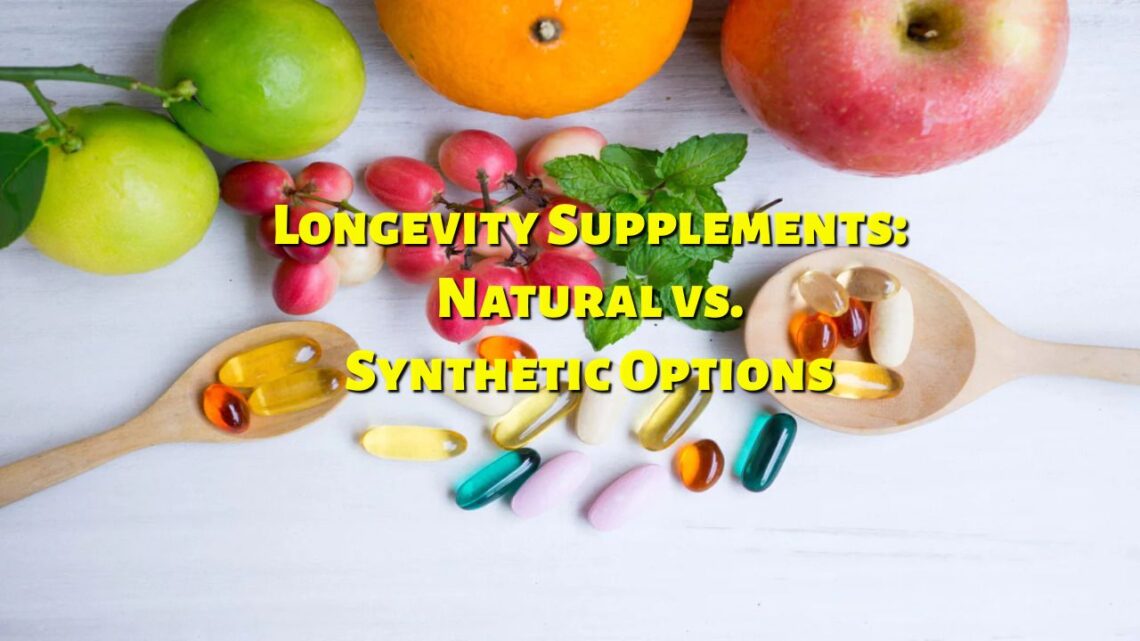
Longevity Supplements: Natural vs. Synthetic Options
In the pursuit of enhancing longevity and overall health, many individuals turn to supplements as a way to support their well-being. With the wide array of options available in the market, it is important to understand the differences between natural and synthetic longevity supplements. You can get more information concerning different longevity supplements on the Longevity Box page.
Natural Longevity Supplements

Natural longevity supplements are derived from plant-based sources and often contain whole-food extracts or concentrates. They are formulated to provide essential vitamins, minerals, antioxidants, and other beneficial compounds that are naturally present in the sources they are derived from. Some popular examples include herbal extracts, such as ginseng, turmeric, and green tea, as well as omega-3 fatty acids from fish oil.
One of the primary advantages of natural longevity supplements is their bioavailability. These supplements are often more easily recognized and utilized by the body due to their natural composition, making them more readily absorbed and utilized compared to synthetic alternatives. Furthermore, natural supplements typically come with fewer side effects and are generally considered safer than their synthetic counterparts.
Synthetic Longevity Supplements

Synthetic longevity supplements, on the other hand, are created in laboratories and aim to mimic the properties of natural compounds. They are often produced through chemical processes and can be found in the form of isolated nutrients or artificially created compounds. Examples include synthetic vitamins and minerals, such as ascorbic acid (vitamin C) or folic acid.
The primary advantage of synthetic longevity supplements lies in their consistency and concentration. As these supplements are manufactured under controlled conditions, their nutrient content can be precisely measured, ensuring accurate dosing. Additionally, synthetic supplements can be more cost-effective compared to natural options.
However, one important consideration with synthetic supplements is that they may lack the co-factors and phytonutrients present in natural sources. These co-factors and phytonutrients often work synergistically with the primary nutrients, providing additional health benefits. Moreover, synthetic supplements may not be as easily recognized and utilized by the body, leading to lower absorption rates and potential nutrient imbalances.
Choosing the Right Option

When considering longevity supplements, it is crucial to make informed choices based on individual needs and preferences. Here are some factors to consider when deciding between natural and synthetic options:
- Personal Health Goals: Consider the specific health goals you want to address with the supplements. Natural options may be preferred if you prioritize holistic approaches and seek a comprehensive nutrient profile. On the other hand, synthetic supplements might be suitable if you require precise dosing or have specific nutrient deficiencies.
- Quality and Purity: Look for reputable brands that adhere to high-quality standards and prioritize transparency. Whether natural or synthetic, ensuring that the supplements are free from contaminants and meet regulatory guidelines is essential for their efficacy and safety.
- Individual Response: Every individual is unique, and what works for one person may not work for another. It’s important to monitor how your body responds to different supplements and consult with a healthcare professional to determine the most appropriate option for your specific needs.
In conclusion, natural and synthetic longevity supplements both have their merits and considerations. Natural supplements offer bioavailability and a comprehensive nutrient profile, while synthetic supplements provide consistency and cost-effectiveness. Ultimately, choosing the right option depends on individual health goals, quality considerations, and personal responsibility. Prioritizing a balanced and diverse diet remains fundamental, and supplements should be seen as a complement rather than a replacement for a healthy lifestyle.



